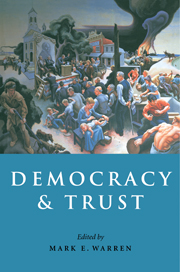Book contents
- Frontmatter
- Contents
- List of figures
- List of tables
- List of contributors
- Acknowledgments
- 1 Introduction
- 2 Do we want trust in government?
- 3 How can we trust our fellow citizens?
- 4 Trust, well-being and democracy
- 5 Democracy and social capital
- 6 Liberty against the democratic state: on the historical and contemporary sources of American distrust
- 7 Trust, voluntary association and workable democracy: the contemporary American discourse of civil society
- 8 Trust and its surrogates: psychological foundations of political process
- 9 Geographies of trust, geographies of hierarchy
- 10 Altruistic trust
- 11 Democratic theory and trust
- 12 Conclusion
- Index
8 - Trust and its surrogates: psychological foundations of political process
Published online by Cambridge University Press: 15 March 2010
- Frontmatter
- Contents
- List of figures
- List of tables
- List of contributors
- Acknowledgments
- 1 Introduction
- 2 Do we want trust in government?
- 3 How can we trust our fellow citizens?
- 4 Trust, well-being and democracy
- 5 Democracy and social capital
- 6 Liberty against the democratic state: on the historical and contemporary sources of American distrust
- 7 Trust, voluntary association and workable democracy: the contemporary American discourse of civil society
- 8 Trust and its surrogates: psychological foundations of political process
- 9 Geographies of trust, geographies of hierarchy
- 10 Altruistic trust
- 11 Democratic theory and trust
- 12 Conclusion
- Index
Summary
Part one: A semantics for “trust” in the context of democracy
Well-defined questions need sharply articulated concepts. The investigation of the role of interpersonal trust in that loose cluster of socialpsychological phenomena we call “the democratic process,” definitive of those democratic institutions that define, for us, a democratic society, requires some well-defined questions about the social-psychological phenomena that we observe, which in their turn require sharply focused concepts. Analytical philosophy grew up as the very instrument that, by making finer and finer distinctions, would provide psychologists, lawyers, political scientists, physicists, and so on with the conceptual armory they needed, but protected against the fallacies and mistakes that come from too superficial a use of characteristic vocabularies. My argument is aimed at substantiating two main intuitions: that the concept of “trust” in most contexts points to a personal relationship, and that the post-Enlightenment shift from governance by custom to governance by code enhances trust in one dimension while weakening it another.
The concepts of “politics” and “democracy” to be deployed in what follows
In developing my analysis, I shall be taking the idea of a “political process” rather broadly, including any procedure by which differences of opinion with respect to the future of some more or less loosely bounded group are resolved. The scale of such processes ranges from departmental (and family) politics (universities offering wonderful examples) to the deliberations of the rulers and managers of collectives of millions of human beings. Among the myriad ways that resolutions of difference are achieved, I shall single out for the accolade “democratic” just those in which the resolving process is discursive.
- Type
- Chapter
- Information
- Democracy and Trust , pp. 249 - 272Publisher: Cambridge University PressPrint publication year: 1999
- 21
- Cited by



